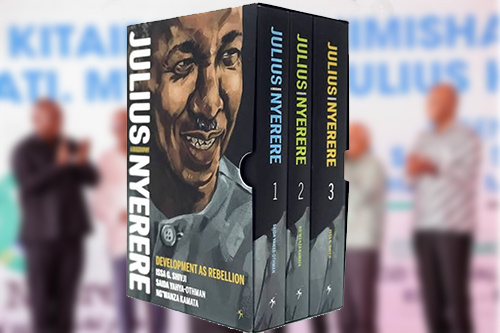President Samia launches comprehensive Nyerere books authored by UDSM dons
By UDSM Staff Writer,
The President of the United Republic of Tanzania, H.E. Samia Suluhu Hassan on 9th April, 2022 launched the first comprehensive biography of the First President of Tanzania, Julius Nyerere authored by three University of Dar es Salaam dons Prof. Saida Yahya-Othman, Prof. Issa Shivji, and Dr. Ng’wanza Kamata.
President Samia launched the three-volume work, Development as Rebellion: Julius Nyerere, a Biography at a special National Symposium to mark 100th Birthday of Mwalimu Nyerere, held at the recently opened Julius Nyerere Leadership School in Kibaha, Coast Region.
She emphasized that this important book should be translated into Kiswahili language for many Tanzanians to read it and understand comprehensively Mwalimu Nyerere’s life and ideas of unity, peace, cooperation and development.
The three-volume book has been described by scholars as “the most comprehensive biography of Nyerere to date, providing unprecedented detail into the life, thought, and career of an elder statesman whose theorizing was explicitly influenced by the weight of his political responsibility.”
Written by three prominent Tanzanians, Prof. Saida Yahya-Othman, Prof. Issa Shivji, and Dr. Ng’wanza Kamata, the work spans over 1200 pages in three volumes. It delves into Nyerere's early days among his chiefly family, and the traditions, friends and education that molded his philosophy and political thought.
Authors have noted that it took them six years to research and write, involving extensive and wide-ranging interviews with persons from all walks of life in Tanzania and abroad. Among these were several leaders in East and Southern Africa who were based in Dar es Salaam during their liberation struggles.
The authors also visited several British universities and archives with material related to Nyerere and Tanzania to enrich the work with primary sources that are not available in Tanzania.
Volume one of the book, entitled The Making of a Philosopher Ruler written by Prof. Saida Yahya-Othman, “introduces Nyerere’s pre-political and extra-political history. The first two chapters highlight his upbringing, education, family life, friendships, and interests in order to provide the reader with a foundation for thinking about Nyerere’s subsequent political development,” writes Springer’s reviewer David Thomas Suell.
According to Suell, volume two, Becoming Nationalist, by Ng’wanza Kamata, shifts the focus of the project from Nyerere the man and the political institutions into which he would insert himself. The two chapters in this short volume remind readers that Nyerere is virtually synonymous with the history of Tanzania and African socialism.
Volume three, entitled Rebellion without Rebels by Tanzanian legal theorist, Prof. Issa Shivji, engages with Nyerere’s mature thought and elaborates most clearly the distinctiveness of the postcolonial setting as a site from which to think about the nation-state, socialism, and democracy.
Meanwhile, President Samia Suluhu Hassan also launched two books authored by other University of Dar es Salaam faculty. One of the books is mainly about foundations, philosophy, and ideologies of CCM, titled Misingi ya Falsafa, Itikadi na Sera za Chama cha Mapinduzi and the other one is a compilation of selected speeches, articles and poems of Mwalimu Julius Nyerere, entitled Mwalimu Julius K. Nyerere: Chemchemi ya Fikra za Kimapinduzi.
Both books are co-authored by Dr. Salvatory Nyanto, a UDSM History Department Senior Lecturer, and Dr. Bashiru Ali Kakurwa, a former UDSM Political Science Department lecturer, CCM General Secretary and Chief Secretary, and currently a Member of Parliament.
Other News
Sun, 10.Nov.2024 : UDSM na UH vyafanikisha upatikanaji wa Kamusi ya Kihispania-KiswahiliFri, 08.Nov.2024 : UDASA Bonanza 2024 picks up vibes
Fri, 01.Nov.2024 : Robotics Bootcamp attracts hundreds of young talents to UDSM, sparks passion for Physics and Technology
Wed, 30.Oct.2024 : Dr. Jackson Justo drives AI-powered energy innovations for sustainable future
Thu, 24.Oct.2024 : Partnership with NMB promises innovation, talent development and digital transformation at UDSM
Wed, 09.Oct.2024 : Economics don Dr. Innocensia John is named among 2024 top Agri-Food Pioneers
Tue, 08.Oct.2024 : School of Mines and Geosciences gears up for Helium exploration in Tanzania
Sat, 05.Oct.2024 : UDSM students excel in 2024 NGEA Award Regional Challenge


